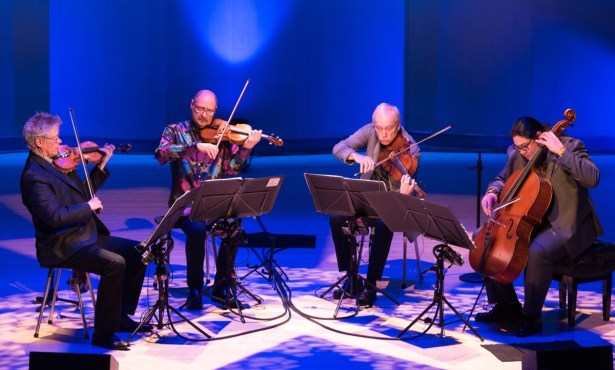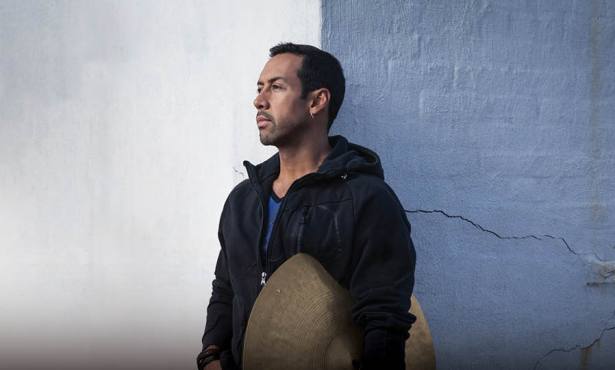Naomi Klein Discusses Our Environmental Future
Author Delivers May 17 Granada Theatre Speech on Climate Crisis.
Noted author, award-winning journalist, documentary filmmaker and progressive activist Naomi Klein gave a free lecture presented by UCSB Arts & Lectures at the Granada Theatre on Wednesday, May 17 at 7:30 p.m. as the keynote address in the Women and the Environment Conference. The topic was “Our Environmental Future: Connection, Collaboration, and Creation,” which came about as an outgrowth from Klein’s last book, This Changes Everything: Capitalism vs.The Climate (2014) as well as her soon-to-be-published book, No Is Not Enough: Resisting Trump’s Shock Politics And Winning The World We Need.
During her lecture, Klein mentioned the need for more women scientists’ voices to be heard on the topic of climate change, as well as noting that the Dakota Access Pipeline struggle at Standing Rock was initiated by women and kids from the Standing Rock Sioux Tribe who took a stand as water protectors in an effort to prevent the possible contamination of the Tribe’s water supply from the upper Missouri River, which provides drinking water for 12 million people. She mentioned that although President Obama ultimately did the right thing by stepping up to the plate in defense of the Standing Rock Sioux Tribe and denying the easement for DAPL, as soon as Trump assumed the presidency, that decision was reversed and the environmental degradation continued apace. Citing Flint, Michigan’s water contamination disaster, as another example, Klein noted that in the United States, communities of color are often discriminated against by design and that this environmental racism needs to stop.
The question, according to Klein, is, “How do you stay hopeful or engaged” in the present, dire political climate? The answer: by getting out from our homes, our screens and coming together with like-minded folks. Klein also noted that the mainstream media often plays a part, through semantics, in framing actions taken, such as those of the Standing Rock Sioux Tribe, in an inherently biased manner. According to Klein “the people [of SRST] are animated by a deep love of place. They are for clean water, for a livable environment. They are not against — they are for. They are not protesters, they are protectors. By standing up and protecting them we are protecting ourselves. Protect the water, because the water protects all of us.”
From there, Klein brought it to the local level, talking about the Santa Barbara oil spill, stating “We could backdate it to the first resistance to environmental theft in 1969. When our beautiful beaches were soiled — a few years after the Summer of Love — when young people were questioning industrial society and consumer cocoons and the addiction to endless growth. In 1962, Rachel Carson published Silent Spring. Her writing inspired a generation regarding the interconnection of humans and nature.” This inspired Utopian and revolutionary thinking — and one year later, there was the first Earth Day. Then, many environmental laws were passed in the early 1970’s by President Nixon.
“We need fundamental change,” Klein said, “but how?” According to Klein, radical and Utopian thought has always been the key ingredient — once placed in a political context — to bring about deep change.
Citing the Crash of ’29, Klein noted that before the Great Depression, we had a generation of workers asking questions, who were familiar with the works of Marx and Du Bois, and who wanted better working and living conditions and leisure time. After the Market crashed, there was the UAWs Flint sit-down strike against GM in Michigan, and other strikes in the U.S.; Upton Sinclair even ran for Governor of California in the 1930s and stated that work places should be co-operatives. Eventually, President Franklin Delano Roosevelt offered the New Deal as a compromise. Though flawed, it went a long way towards creating a better society, through the creation of Social Security, the Glass-Steagall Act of 1932, and other measures.
“Over time, the right developed a counter-strategy, waiting for disaster and imposing changes from above — the globalization of Reganomics,” Klein said. The result was a Neoliberal takeover. Since the dawn of the 21st century, we have been in need of a new people-based wake up call, she said. Some thought Hurricane Katrina, Flint’s water crisis, or the market crash of 2008 would serve that purpose, according to Klein. “War has been waged on our imaginations. We are inside a matrix which needs to change,” Klein opined. “9/11 showed how the Bush Administration used people’s fear and dislocation to launch illegal wars.” Trump getting the presidency seemed to finally be the wake up call, as The Women’s March, The March for Science, The People’s Climate March, and A Day Without Immigrants have seen the people taking it to the streets in a huge way; along with the emergence of Black Lives Matter, the minimum wage movement, and other popular movements advocating for equality and justice.
As regards the current state of coming up with viable sustainable energy alternatives, citing the negative example of Canada’s Alberta Oil Sands fiasco, Klein proclaimed that endless extraction is not sustainable — for the environment or for workers’ bodies, and that cutting the social safety net is not acceptable. “We need deep care taking and inclusion,” Klein noted. “A deep consent culture instead of a might-makes-right culture.” To this end, Klein help co-author Canada’s Leap Manifesto (leapmanifesto.org) which states, in part:
The time for energy democracy has come: we believe not just in changes to our energy sources, but that wherever possible, communities should collectively control these new energy systems.
Based on a “polluter pays” principle, the Leap Manifesto calls for “… an end to fossil fuel subsidies. Financial Transaction taxes. Increased resource royalties. Higher income taxes on corporations and wealthy people. A progressive carbon tax. Cuts to military spending.” Some of the ideas put forth in the Leap Manifesto have already proven effective in Denmark and Germany (where Klein said 400,000 green jobs have been created). “It is easier to change our economic system than it is to change the course of nature. Now is the time for boldness. Now is the time to leap,” she concluded.



